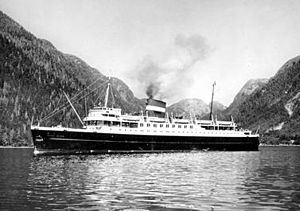SS Prince George (1947) facts for kids
The SS Prince George was a passenger ship built in 1947. It sailed for the Canadian National Steamship Company, taking people from Vancouver, British Columbia, to Southeast Alaska. This ship replaced an older SS Prince George from 1910, which was badly damaged by a fire in Ketchikan, Alaska, in 1945.
 |
|
Quick facts for kids History |
|
|---|---|
| Name | Prince George |
| Owner | Canadian National |
| Route | Inside Passage |
| Builder | Yarrows Ltd, Esquimalt, BC |
| Launched | October 6, 1947 |
| In service | June 1948 |
| Out of service | 1995 |
| Fate | Burned in Britannia Beach, BC, and later towed to scrappers in China, but sank on the way. |
| General characteristics | |
| Class and type | coastal liner |
| Tonnage | 5,812 gross tons |
| Length | 350 ft (107 m) |
| Beam | 52.1 ft (15.9 m) |
| Depth | 17.7 ft (5.4 m) |
| Decks | 7 |
| Installed power | twin steam engines, six cylinder, bore of 23 in (580 mm) and stroke of 26 in (660 mm) |
| Propulsion | propeller |
| Speed | 18 kn (33 km/h; 21 mph) |
| Capacity | 322 passengers, 50,000 cu ft (1,400 m3) freight |
Contents
Building the Ship
The Prince George was built at Yarrows Ltd. in Esquimalt, British Columbia. Building this ship cost $3,000,000. At the time, it was the largest private commercial ship ever built in Canada.
Ship's Size and Features
The Prince George was 350 feet (107 m) long. It was 52.1 feet (15.9 m) wide and 17.7 feet (5.4 m) deep. The ship weighed 5,812 tons.
Passenger Areas
The Prince George could carry 322 passengers. Most of these passengers, 294 of them, were considered first class. Each stateroom had beds that could fold away. This allowed the room to become a sitting area during the day. The ship also had special luxury suites and a playroom for children.
Decks and Cargo
The ship had seven decks. It looked modern with a smooth, streamlined shape. The Prince George also had space for 50,000 cubic feet (1,400 m3) of cargo. This included 5,000 cubic feet (140 m3) of refrigerated space for items needing to stay cold. An elevator helped move cars from a lower deck to the main deck for loading and unloading.
How the Ship Moved
The Prince George was powered by two steam engines. These engines used steam from four large boilers. The ship could travel at a speed of 18 knots (33 km/h; 21 mph).
Ship's Journeys
On October 18, 1953, the Prince George ran aground (hit the bottom) in heavy fog. This happened at Ripple Point in Johnstone Strait. The ship's radar was not working at the time. The captain, E.B. Caldwell, was guiding the ship using its whistle and echoes. He saw the point just before the ship hit it. He quickly turned the ship, which stopped it from hitting head-on. The ship only had minor damage. Tugs helped the Prince George get to port. One of its engines was still working. No one was hurt in this incident.
In 1959, the Prince George started offering summer cruises to Alaska. These trips began from ports in British Columbia.
What Happened to the Ship
The ship was sold in 1976. It was used as a floating restaurant for a while. It had several different owners. In October 1995, the Prince George caught fire at Britannia Beach, British Columbia. After the fire, it was sold to be taken apart for scrap metal. While being towed to China, the ship sank in Unimak Pass.
 | James Van Der Zee |
 | Alma Thomas |
 | Ellis Wilson |
 | Margaret Taylor-Burroughs |

